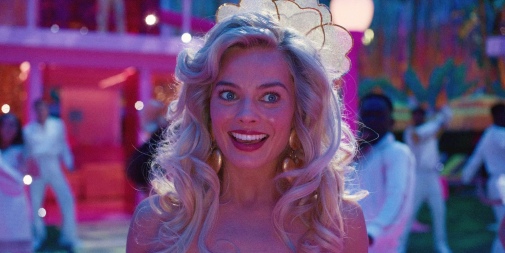
Everybody complains about comedic performances not getting their due on awards season. But of course, the instant such work becomes a serious contender, the knives come out. These achievements are generally dismissed, as if straight drama was inherently superior to broad comedy. I'm not accusing anyone in particular, but it is a phenomenon that can be felt across cinephilia, especially when it involves a movie like Barbie, which tapped into the zeitgeist and somehow became one of the year's defining movies. I thought about writing on the reaction to Ferrera's Best Supporting Actress nomination or how the tides have turned on Gosling as the season unfolded. Yet, Robbie was perfect for the Almost There Series, so here we are.
With the 96th Academy Awards mere days away, the dust should have settled after the collective psychosis that followed the movie's "snubs" in Best Director and Best Actress. At least, I hope cool heads prevail as I dive into Margot Robbie's portrayal of Stereotypical Barbie…
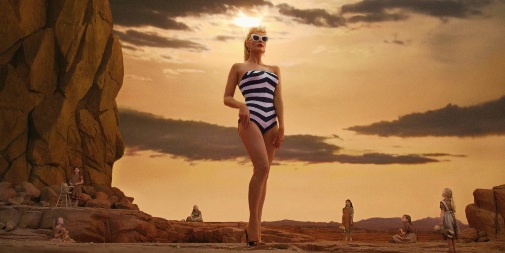
Our first glimpse of Robbie as the Mattel icon comes in the 2001: A Space Odyssey opening, when little girls reject the maternal role imposed by baby dolls and embrace their new plastic messiah - Lisan al Gaib found dead in a ditch. As an introduction to the actress' characterization, it's not especially insightful, but it does suggest the role's unique challenges. Barbie, as imagined by Greta Gerwig and Noah Baumbach, isn't a character so much as an idea formed over decades of cultural shifts, changing iconography, social mores, and marketing campaigns. That's why there can be a plurality of Barbies, representing the line's different products and her ever-mutating state. The collective "she" of Mattel's creation can be anything.
But how do you act out someone – or something – who stands for endless possibility yet must also exist as a constricted archetype for the narrative's sake? Within this internal cosmology and topsy-turvy reasoning, what does it even mean to be Stereotypical Barbie, and how can one perform the point when a concept becomes a character, when plaything becomes a person? What variations between stylization and humanity, the facsimile of feeling and actual emotion, should be expressed throughout her arc? How does one negotiate those ideas and make them coherent but also kid-friendly and non-cerebral in the way blockbuster heroines must be? On a first analysis, Margot Robbie's part seems simple. It's anything but.
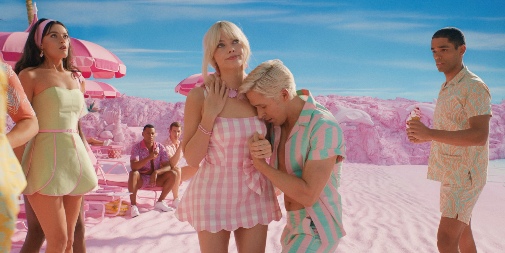
Indeed, that it seems so simple is a testament to her skill, making the near-impossible come off as easy and effortless. Consider the sequence that welcomes us to Barbieland and our protagonist's about-to-be-shaken status quo. Robbie is hyper-femme perfection as understood by and designed for a childlike perspective. She simultaneously inhabits the role as an alienating high-concept ideal and an infantile sort of playacting. There are hints of rigid plastic in her stiff gestures and fixed expression, but the physicality also encapsulates the giddiness of an overexcited kid. It's impressive she doesn't become the grotesque vision of a grown woman acting like a baby – she's Barbie, not Bella Baxter.
By the time the "day in the life" intro draws close and Dua Lipa's "Dance the Night" takes over the soundtrack, Robbie has established this Barbie. Her line readings are tapped into the silliness, delivered in a way that accounts for the absurdity without falling into irony, self-aware but not too much, naïve but not stupid. There have also been hints of the slightly patronizing relationship with her Ken. Acting opposite Gosling, Robbie makes them read more like siblings than paramours. They're a big sister and her himbo brother playing parts neither fully understands though they accept them like divine providence. With normalcy conveyed, a disruption is inevitable. Time for Barbie to think about dying.
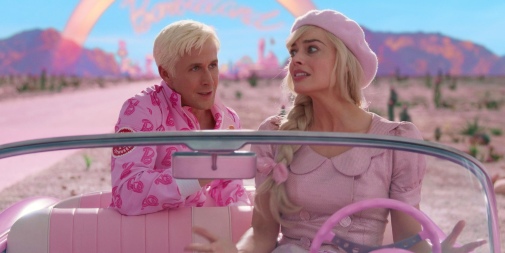
In a desperate attempt to keep face, Stereotypical Barbie starts to slip into personhood, and so does Robbie's performance. It's just the beginning of a change that continues with the next morning's frazzled imperfections, rendered as slapstick with an undercurrent of earnest distress. That said, my favorite tidbits are the physical transformations that go way beyond flat feet. Notice her ungainly walk, the uncertainty of a once perfect posture, subtle fidgeting that used to be non-existent as one beautiful pose transitioned into another. Fashion doll perfection becomes more and more distant, out of reach. Do you know what's not out of reach? Ken!
Adventuring away from Barbieland, the pair are a strange match. Robbie brings frustration to the forefront, though a modicum of comfort comes through as Barbie is shocked to discover that the real world is not what she imagined. Confusion overwhelms, both hilarious and heartbreaking, a weird balance the actress keeps negotiating at different levels depending on the scene. One moment, she's forging a connection with Ann Roth at a bus stop, a burst of comfort that almost demands the film stop its hijinks and breathe. Ache can be good, and Robbie expressed that discovery as if it were a poetic epiphany. For one moment, she's as human as human gets.
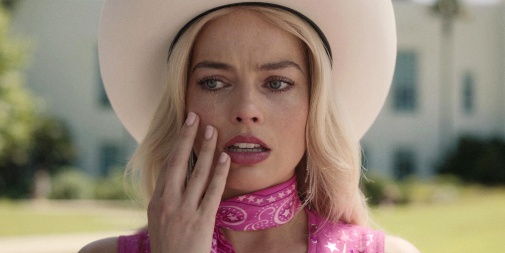
And not long after, she's bullied into tears by Bratz look-alikes, dumbfounded over fascist accusations. How can she be a fascist when she doesn't control the railways or the flow of commerce? Honestly, it's a good candidate for line reading of the year. I can't tell you how much I laugh at these moments every time I revisit them, always stunned at Robbie's no-holds-barred sincerity. More interesting still is how she modulates Barbie's regained enthusiasm after she escapes the Mattel offices, meets the ghost of her creator, and finally finds American Ferrera's Gloria. A lesser performer would just return to the intro's register, but Robbie makes the giddiness less poised or posed. It's messier, it's human.
Back in Barbieland with Gloria and her daughter in tow, Barbie discovers paradise overthrown by patriarchy, her erstwhile second banana now turned into the Kens' revolutionary leader. Startled by the current state of events, Robbie's new candor gains new permutations. Her disappointment feels authentic, no matter that it inevitably erupts in a toddler-like tantrum that's also a crash down into depression. In this regard, she almost becomes an inverse mirror of her messed-up Ken. There's still an opportunity for physical comedy when Barbie gives up, but the clarity of her sentimental journey stays with you long after the laughs die down.
Now, much has been written about America Ferrera's monologue. I don't have much to add except that despite its clumsiness, the writing also posits a formidable test to the two women tasked with bringing it to life. There's the Supporting Actress nominee and her vociferous outrage, but one should appreciate what Robbie's doing with the material. It's her reaction that gives the thing whatever dramatic weight it can get, the way her voice breaks with an exhaustion that would have seemed alien at the movie's beginning. She supposedly snaps out of her discontent, but being inspired into action doesn't solve everything.
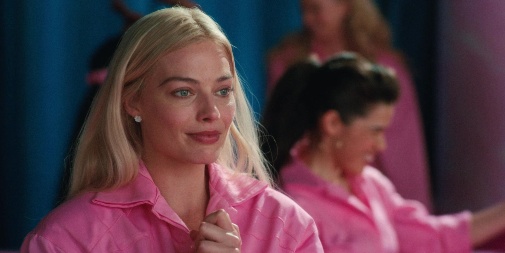
Her acting as Stereotypical Barbie to manipulate Ken doesn't just feel hollow because it's a lie. One gets the sense such a picture-perfect existence, even if Barbieland's order is re-established, wouldn't fulfill this quasi-person anymore. Later, notice the camera lingering on Robbie's face as the Barbies retake their pink Capitol. Everyone is basking in the glory of their victory, but our lead looks unsure, lost in thought and spirit. When she reencounters Ken, it's another instance of understated loveliness. She plays it in a minor key so that the film's spelled-out conclusions sound like personal self-realization, matter-of-fact rather than script mechanisms. It's warm, with just enough sugar to be sweet and not sickening.
Accepting the end of herself, whether that's mortality or the obsolescence of her Barbie perfection, the film's heroine reaches a void that's an existential crossroads dressed down in a different fashion set. Watching Barbie for the first time, Robbie's approach shocked me, its weary melancholy an unlikely endpoint for what many have understandably characterized as a feature-length toy commercial. Barbie's single tear as humanity overcomes her is clichéd, I'll grant you that. However, it's also a perfect summation of Robbie's creation as she travels beyond this narrative into the unknown. Or, as the case may be, the gynecologist's office for a funny little stinger.
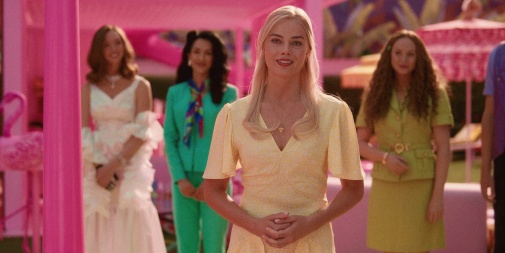
For some, none of this was enough to earn Robbie respect as a Best Actress contender. Nevertheless, she got into all the right precursors, including the big four – Golden Globe, Critics Choice, BAFTA, and SAG. She's now one of only thirteen actors to secure this quartet without a subsequent Oscar nomination. Instead of Robbie, AMPAS chose Annette Bening in NYAD, Lily Gladstone in Killers of the Flower Moon, Sandra Hüller in Anatomy of a Fall, Carey Mulligan in Maestro, and Emma Stone in Poor Things. At this point, the race seems to be between Gladstone and Stone, though anything can happen next Sunday. It should also be noted that Robbie did get an Academy Award nomination this year as one of Barbie's producers, contending for the Best Picture Oscar.
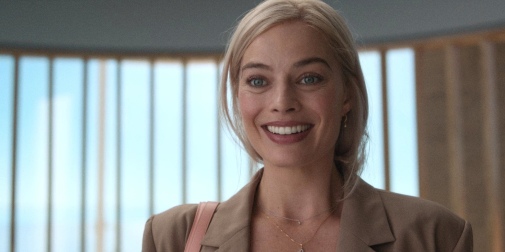
Barbie is streaming on Max. You can also find it on most major platforms, available to rent and purchase.